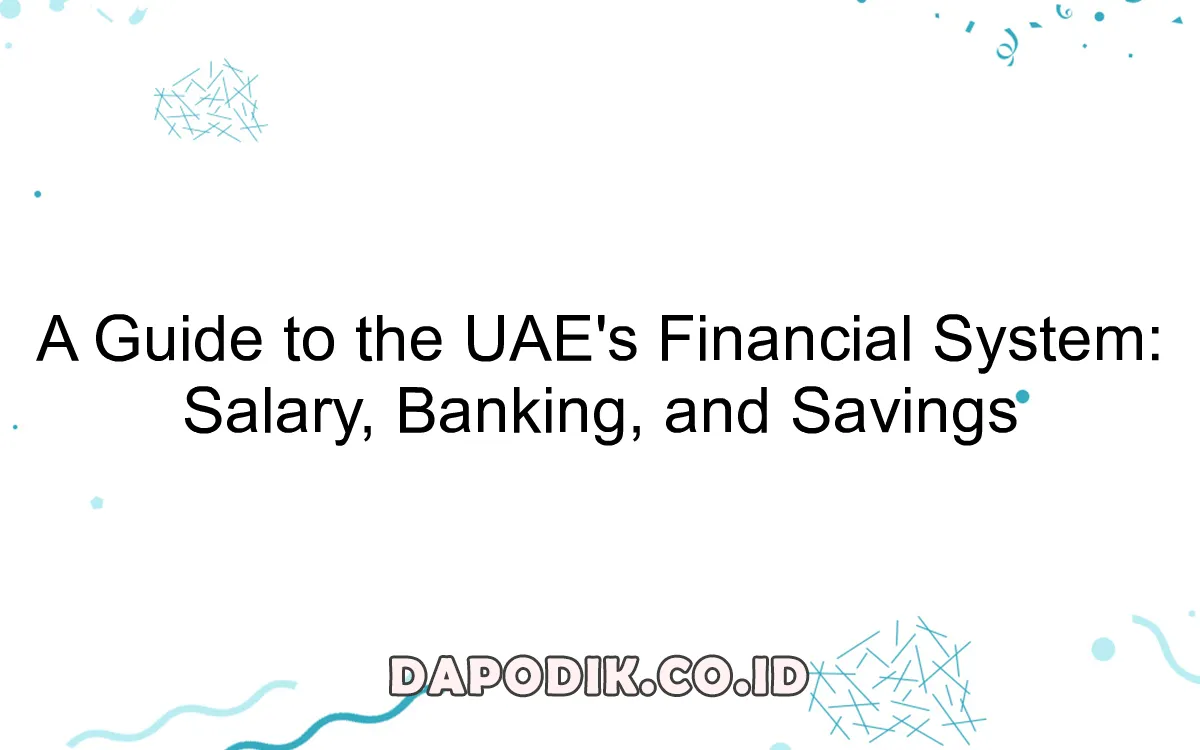A Guide to the UAE's Financial System: Salary, Banking, and Savings
The United Arab Emirates (UAE) boasts a robust financial system that encompasses salary structures, banking services, and opportunities for savings. In this comprehensive guide, we will delve into the intricacies of the UAE’s financial landscape, providing invaluable insights for individuals looking to navigate and maximize their financial well-being in this dynamic region.
Understanding the UAE’s Salary Structure
When it comes to working in the United Arab Emirates (UAE), having a clear understanding of the salary structure is essential. In this article, we will explore the salary system in the UAE to help you grasp the fundamentals of how salaries are determined and what factors can influence them.
Basic Salary
The basic salary is the fixed amount an employee receives each month, excluding any additional benefits or allowances. It serves as the foundation of the salary structure and is generally mentioned in the employment contract.
Allowances and Benefits
In addition to the basic salary, employees in the UAE often enjoy various allowances and benefits. Common types include housing allowance, transportation allowance, and medical insurance. These additional perks significantly contribute to an employee’s overall compensation.
Bonuses and Incentives
Bonuses, such as annual performance bonuses or end-of-service gratuity, are commonly offered to employees in the UAE based on their performance and length of service. Additionally, some companies offer other incentives like sales commissions or profit-sharing schemes.
Tax-Free Income
One of the unique features of working in the UAE is the absence of personal income tax. This means that the salary you earn is not subject to taxation, allowing you to potentially save a substantial portion of your earnings.
Cost of Living
While the UAE offers attractive salary packages, it’s essential to consider the cost of living in the country. Expenses like accommodation, schooling, transportation, and healthcare can vary significantly depending on the emirate you live in. Proper financial planning is crucial to ensure your salary meets your needs adequately.
Planning for the Future
To make the most of your salary and secure your financial future, it is advisable to save and invest wisely. The UAE offers a range of banking services, including savings accounts, fixed deposits, and investment options. Consulting a financial advisor can help you make informed decisions tailored to your financial goals.
In conclusion,
Understanding the salary structure in the UAE is essential for individuals seeking employment or already working in the country. By knowing how salaries are structured and considering various aspects, such as allowances, bonuses, and the cost of living, you can make informed financial decisions and maximize your earning potential. Remember to plan for the future by saving and investing wisely to achieve your long-term financial goals.
Overview of Banking Services and Options

In this article, we will provide an in-depth overview of banking services and options available in the UAE. Whether you are a resident or an expatriate, understanding the financial system and various banking services is essential for managing your salary, banking transactions, and savings effectively.
1. Salary Deposits
One of the primary functions of a bank account is to receive your salary deposits. In the UAE, most employees have their salaries transferred directly into their bank accounts. This offers convenience, security, and easy accessibility to your funds.
2. Current and Savings accounts
Banks in the UAE offer a variety of account options, including current accounts and savings accounts. Current accounts are primarily used for day-to-day transactions, while savings accounts help you save money and earn interest on your balance.
2.1 Fixed Deposit Accounts
Fixed deposit accounts are a popular option for those looking to earn higher interest rates on their savings. These accounts require you to deposit a specific amount of money for a fixed period, typically ranging from 1 to 12 months. The longer the deposit period, the higher the interest rate you can earn.
3. Online and Mobile Banking
Most banks in the UAE offer online and mobile banking services, allowing you to conveniently access your accounts, make transactions, and manage your finances from anywhere at any time. These services provide a secure and user-friendly platform for banking on the go.
3.1 Mobile Wallets
Mobile wallets have gained popularity in the UAE, allowing users to make payments and transfer money using their smartphones. It offers a convenient and secure alternative to carrying physical cash or cards.
4. Credit and Debit Cards
Banks in the UAE provide a wide range of credit and debit card options. Credit cards offer the flexibility of making purchases on credit, while debit cards allow you to spend from your current or savings account directly. Both options come with various benefits and rewards programs.
5. Loans and Mortgages
If you are looking to make a big purchase or invest in real estate in the UAE, banks offer a range of loan and mortgage options. It is crucial to understand the terms, interest rates, and repayment plans associated with these financial products.
6. Foreign Exchange and Remittances
For expatriates in the UAE, banks provide foreign exchange services and remittance options. These services allow you to convert currencies and send money to your home country or anywhere around the world securely.
7. Investment and Wealth Management
Banks in the UAE offer investment and wealth management services to help you grow your savings and achieve your financial goals. These services include mutual funds, stocks, bonds, and other investment opportunities.
7.1 Retirement Planning
Planning for retirement is crucial, and banks can provide various retirement planning options, such as pension funds and retirement savings plans, to secure your financial future.
Effective Strategies for Saving Money in the UAE
When it comes to managing your finances in the United Arab Emirates (UAE), it is important to have effective strategies in place for saving money. Whether you are a local resident or an expatriate, these tips can help you make the most of your earnings and build a solid financial foundation.
Create a Budget and Stick to It
One of the key steps in saving money is creating a budget. Start by analyzing your income and expenses to determine how much you can save each month. Allocate a certain percentage of your income towards savings, and track your spending to ensure you stay within your budget. Use online tools or mobile apps to help you manage your finances effectively.
Minimize Your Living Expenses
In the UAE, living expenses can be high, so it is essential to find ways to minimize them. Consider renting a smaller house or apartment, carpooling or using public transportation instead of owning a car, and conserving energy and water to reduce utility bills. Look for deals and discounts when shopping for groceries and other necessities.
Avoid Impulse Buying
Impulse buying can quickly drain your savings. Before making a purchase, ask yourself if it is a necessity or simply a desire. Give yourself some time to think before buying expensive items and try to distinguish between wants and needs. By avoiding impulse buying, you can save a significant amount of money over time.
Automatic Savings
Set up automatic transfers from your salary account to your savings account. By doing this, a portion of your income will be automatically saved before you have the chance to spend it. Make saving a priority and aim to increase the amount you save over time.
Take Advantage of Savings and Investment Options
The UAE offers various savings and investment options, such as fixed deposits, mutual funds, and individual savings accounts. Research and seek advice from financial experts to determine which option suits your goals and risk tolerance. Diversify your investments to minimize risks and maximize potential returns.
Track Your Progress
Regularly review your savings progress to stay motivated and make adjustments if necessary. Monitor your expenses, savings, and investments to ensure you are on track to reach your financial goals. Celebrate milestones along the way to acknowledge your achievements and stay motivated.
Conclusion
In conclusion, understanding and managing the UAE’s financial system is vital for anyone working or residing in the country. From salary structures and banking services to savings options, individuals can benefit from a robust and dynamic financial sector. By staying informed and making smart financial decisions, individuals can leverage the UAE’s financial system to achieve their goals and secure a stable financial future.

Posting Komentar untuk "A Guide to the UAE's Financial System: Salary, Banking, and Savings"
Gambar ataupun video yang ada di situs ini terkadang berasal dari berbagai sumber media lain. Hak Cipta sepenuhnya dipegang oleh sumber tersebut.